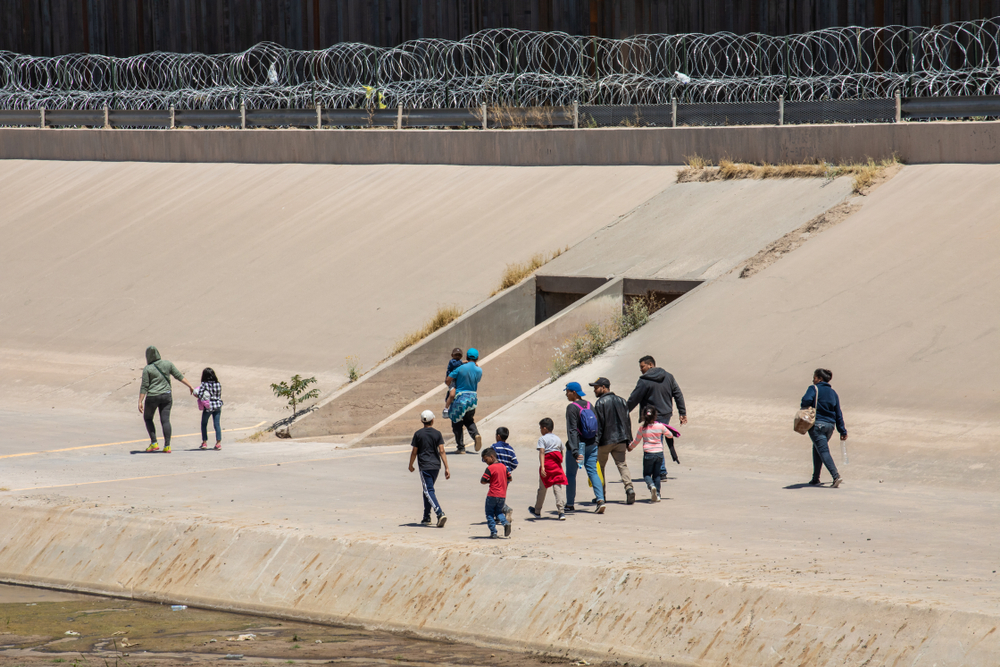Immigrants who face torture, rape and other forms of persecution in their home countries have long faced a gamble when they attempt to find protection in the United States.
Under the Trump administration, the odds of succeeding have grown significantly longer, according to a recent report.
Immigration court judges have denied significantly more asylum petitions than in previous years, according to data compiled by the Transactional Records Access Clearinghouse at Syracuse University, which found the denial rate was 71.6%, compared to the 54.6% rate in 2016, the last year of the Obama administration.
The findings were not unexpected to experts who work with immigrants and say the administration has attacked immigration protections from numerous directions. In particular, immigrants who faced threats from private actors – as opposed to overt government action – have found their claims unrecognized. These include people who were victims of domestic violence and gangs.
Experts distressed, but not surprised by report
The report is “distressing and disappointing, but also not surprising in any way,” said Lindsay M. Harris, director of the Immigration & Human Rights Clinic at the University of the District of Columbia David A. Clarke School of Law. Harris said the administration’s actions have shown particular animus toward people from Central America.
“They really are very focused on trying to undermine these types of claims,” she said.
RELATED: Having trouble keeping track of the Trump lawsuits? Here’s a scorecard.
RELATED: Fewer child sex trafficking prosecutions under Trump
Joanne Gottesman, law professor and director of the Immigrant Justice Clinic at Rutgers Law School, said the report is “not at all surprising to me given what I’ve seen in my own cases and what I know of what’s happening in the courts and in particular with regard to asylum and in particular the Trump administration’s assault on asylum.”
Gottesman said there’s a myth that asylum seekers are law breakers.
“People are supposed to be able to come to the border and ask for protection,” she said. “I think there’s this notion that they’re somehow violating the law. They’re not. That’s the thing. Notwithstanding the manner of entry, people are supposed to be able to seek protection. To the extent that our government has tried to stop them from even asking is troubling.”
Both Harris and Gottesman cited a well-known 2009 book called Refugee Roulette: Disparities in Asylum Adjudication and Proposals for Reform that talked about the gamble asylum seekers were forced to take in American courts. The book publication followed a 2007 Stanford Law Review publication of the same name by the same authors, who cited differing rates of asylum grants from different courts and judges that they said left them “quite troubled.”
Report shows wide differences between immigration judges
The TRAC report also documents what Gottesman said is an open secret among immigration lawyers, which is that the chances of succeeding on an asylum petition are vastly different, depending on the judge who hears the case. That’s true even for cases heard in the same jurisdiction.
The New York Immigration court had the widest disparity between its judges, with denial rates ranging from 95% to 3%, depending on the judge.
“We know the judge you get makes all the difference,” Gottesman said.
Sometimes, she said, the judges more inclined to deny petitions are newer and on probation. While that’s not always the case, she said this tendency “goes to the issue of a lack of true independence in the immigration court.”
Gottesman said she practices primarily in Newark, NJ, where the denial rate among judges ranges from 6.9% to 79.3%, according to the TRAC report. Gottesman said this “huge range” documented in the report rings true to her experience in the court.
Immigration courts different from other courts
Unlike standard federal courts, which are an independent branch of the government, immigration courts are part of the Justice Department in the executive branch. Immigration judges are Justice Department employees without the independence or protections of federal court judges, who hold lifetime appointments and must be approved by the Senate.
This means, among other things, that presidents and their administrations have much more power to set policy and select judges in the immigration system who will uphold their priorities.
In addition to refusing to recognize asylum claims based on persecution by private actors, such as domestic violence cases, the administration has pressured immigration judges to move cases quickly and limit grants of asylum in other ways, according to Gottesman.
“The impact on individuals is there are so many individuals who have legitimate fears of returning to their home countries based on persecution because of their identity,” Gottesman said, “and the administration is making it impossibly difficult for them to present their claims, have their day in court and get the protection that they need.”
Another factor that can affect the odds of success is whether an asylum seeker has legal representation. There is no guarantee of a lawyer in immigration court, and public defenders don’t work there. Overall, asylum seekers with lawyers had a 31.1% chance of success, while those without had a 17.7% chance, according to the TRAC report.
Gottesman said she has also seen that it’s “exponentially better if you have a lawyer versus not having a lawyer.” She said her clinic doesn’t charge a fee for representation but is able to accept only a small number of cases.
“It’s incredibly difficult,” she said. “It’s so hard to turn away clients, but, unfortunately, we do.”
So, the first lottery asylum seekers face is whether they can obtain legal representation. The second lottery is the identity of the judge.
Chinese immigrants fare better than Hondurans
Another lottery involves the country of origin. People from certain countries, like China, India and Cameroon, had the highest levels of success. Immigrants from China seeking asylum had a denial rate of 23.3%, according to the report, while immigrants from India and Cameroon had denial rates of 38% and 38.4%.
Among the countries of origin with the most asylum decisions, the report found Hondurans having the least success, with a denial rate of 87.3%. That was followed by Guatemala with a denial rate of 85.8% and Mexico with denials 85% of the time.
These denials came in spite of the fact that U.S. State Department reports on human rights describe extensive abuses in those countries. For example, the 2019 report on Honduras says:
“Significant human rights issues included: unlawful or arbitrary killings, including extrajudicial killings; torture; harsh and life-threatening prison conditions; arbitrary arrest or detention; killings of and threats to media members by criminal elements; criminalization of libel, although no cases were reported; widespread government corruption; and threats and violence against indigenous, Afro-descendent communities, and lesbian, gay, bisexual, transgender, and intersex (LGBTI) persons…
“Organized criminal elements, including local and transnational gangs and narcotics traffickers, were significant perpetrators of violent crimes and committed acts of homicide, torture, kidnapping, extortion, human trafficking, intimidation, and other threats and violence directed against human rights defenders, judicial authorities, lawyers, the business community, journalists, bloggers, women, and members of vulnerable populations. The government investigated and prosecuted many of these crimes, particularly through the HNP’s Violent Crimes Task Force.”
But even this assessment has been tempered, Harris noted. The Catholic Legal Immigration Network compiled a comparison between the annual State Department reports issued in 2016, the final year of the Obama administration, and the one issued in 2019 regarding Honduras.
The 2016 Honduras report was 43 pages long, compared to 26 pages for the 2019 report, the comparison notes.
In one example given, the 2019 report provides only numbers from the Public Ministry regarding “23 cases of alleged torture,” where the 2016 report includes information from the National Human Rights Commission about “221 complaints implicating members of the security forces or other government officials in torture or other cruel or inhuman treatment.”
In this example, the 2016 report also includes the fact that the National Committee for the Prevention of Torture, Cruel, Inhuman or Degrading Treatment “reported 70 complaints against government officials for human rights violations, the majority relating to detention conditions.”
The 2019 report also excludes language in the previous report about how children are employed by gangs to serve as lookouts and collect extortion payments and how children were killed in government detention facilities.
Hopes for change under Biden
Because immigration courts are more subject to the priorities of the executive branch, experts hope to see improvements for asylum seekers under the Biden administration. But they said the challenges are enormous.
Harris said few of the changes the Trump administration made were approved by Congress, and so Congressional action shouldn’t be required to roll many of them back. “The issue is it’s going to be hard for Biden to do some of this politically,”
And she said the number of changes that need to be rolled back is overwhelming. There have been, Harris said, more than 400 changes in the last four years.
To give an example, there’s an immigration form that includes a box for applicants to list their siblings. There are four spots in the box, Harris said. If an applicant has just two siblings and leaves two spots blank, the application will be rejected.
And that rejection takes six to eight weeks to process, Harris said. At the end of that time, the applicant has to start the process all over again. The delay affects not only the asylum application, but access to things like work permits.
An example of the enormous task faced by the incoming administration is the fact that there are an estimated 68,000 asylum seekers who were forced by the Trump administration to wait in Mexico under what Harris described as “pretty dangerous, precarious conditions” for their cases to be heard.
Harris said Biden likely won’t be able to just open the door to all those people at once.
“I absolutely think he should” allow them in, Harris said. “I think there are safe ways to do that, but it is going to be a massive undertaking.”
Contact Elaine Silvestrini at [email protected]. Follow her on Twitter at @WriterElaineS.












